Mahsa Amini’s Mother Decries Authorities For Blocking Prize Trip
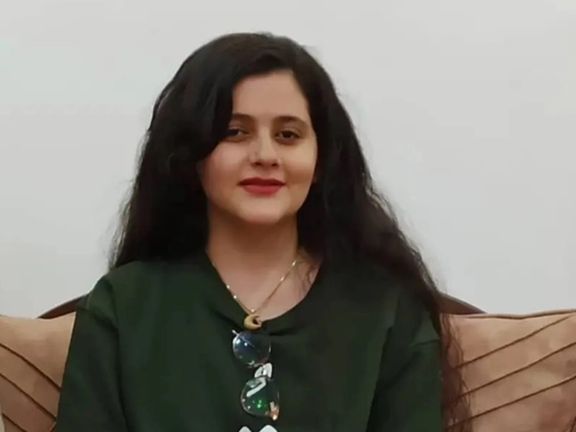
Mojgan Eftekhari, the mother of Mahsa Amini, strongly denounced the authorities for obstructing their family's departure for France to receive the Sakharov Prize.

Mojgan Eftekhari, the mother of Mahsa Amini, strongly denounced the authorities for obstructing their family's departure for France to receive the Sakharov Prize.
On Friday, as Amjad Amini, Mojgan Eftekhari, and Ashkan Amini, the father, mother, and brother of Mahsa Amini, were en route to France for the Sakharov Prize ceremony, they were informed at the airport about the travel prohibition, with their passports confiscated.
Mahsa Amini, a 22-year-old woman, was detained by Iran's morality police in mid-September 2022, leading to her tragic death within three days of critical head injuries, sparking nationwide protests.
Expressing her frustration on Instagram, Eftekhari questioned the government's ignorance, stating, "How clueless the rulers are, not realizing the impact of Mahsa's name?" She labeled the Iranian officials as "deceptive rulers," accusing them of consistently attempting to erase Mahsa's indelible memory through deceitful maneuvers.
Earlier, Roberta Metsola, the President of the European Parliament, urged the Islamic Republic to lift the travel ban imposed on Mahsa Amini's parents and brother.
The European Union declared on October 19 that Mahsa Amini and the Women, Life, Freedom movement would be recipients of the Sakharov Prize.
The Amini family has faced heightened security pressure since Mahsa's death in the custody of the morality police, coinciding with the onset of the Iranian people's uprising against the Islamic Republic.
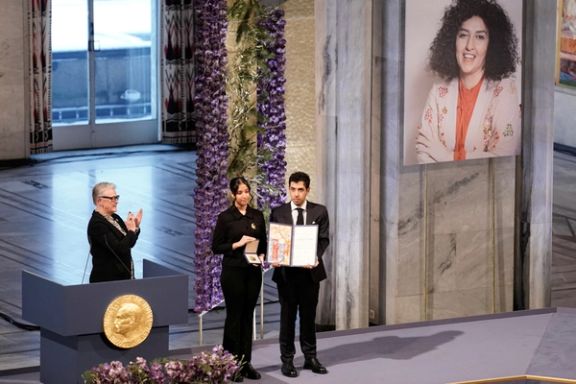
The Nobel Peace Prize ceremony honoring Iranian activist Nargess Mohammadi took place in the Norwegian capital of Oslo while she is on hunger strike in prison.
Mohammadi, a human rights activist currently incarcerated, was absent from the ceremony, with her family accepting the award on her behalf.
The Nobel Peace Prize ceremony on Sunday coincided with Human Rights Day. On October 6, as announced by the Nobel Committee, Mohammadi was awarded the Nobel Peace Prize for 2023 "due to her struggle against injustice towards Iranian women and her efforts to advance human rights and freedom for all."
In the absence of the imprisoned human rights activist, the prize was received by her husband, Taqi Rahmani, and their twin children, Kiana and Ali.
In a pre-ceremony interview with Iran International, Ali Rahmani stated that his mother, who is currently in prison, should have been present at the award ceremony. He and his sister, Kiana, aim to represent their mother's voice.
Kiana also expressed admiration for individuals of similar age “who took to the streets and sacrificed their lives for the cause.” She emphasized that the Nobel Peace Prize is not only for her mother but also for all Iranian women.
Narges Mohammadi, born in 1972 in Zanjan, holds a degree in applied physics. She commenced civil and political activities during her university years. Over the years, she has received several international awards, including the Sakharov Prize from the American Physical Society in 2018, the International Press Freedom Award in 2016, and the Alexander Langer Award in 2009.
In recent years, Mohammadi has faced multiple arrests, trials, and many years in prison for her human rights activities. She was last arrested in 2021 and has been in Evin Prison since then.
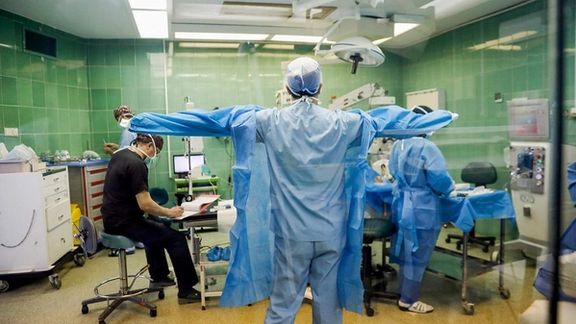
Controversy has erupted in Iran after hardliners demanded specifically designed gowns conforming to hijab rules to be made compulsory in hospitals and operating rooms.
Twelve versions of Islamic surgical gowns have been designed for female patients in the operating room to comply with Sharia rules, announced Mohammad-Hossein Taheri-Akerdi, the secretary of a state body responsible for promotion of Islamic standards, whose main concern has always been promotion of hijab.
Taheri-Akerdi said Tuesday that the standard clothing currently worn by patients in hospitals violates women’s “dignity” and responsible government bodies have been instructed to identify the standards of religiously required and forbidden aspects in respect to “hijab and chastity” in hospital environments.
The entity that Taheri-Akerdi represents is a state-funded organization with a budget of 1.25 trillion rials (around $2.5m) in the current fiscal year, with an increase of 125 percent compared to the previous year. An even higher budget is expected to be allocated to the organization for the next year.
Not only those who oppose the compulsory hijab, but also many religious people are against the various measures that religious fundamentalists are employing to enforce the hijab rules.
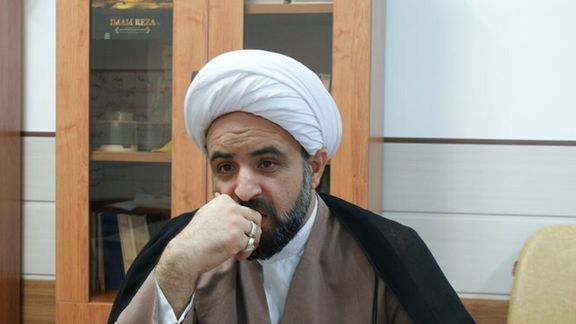
“One feels like standing in front of a hidden camera and waiting for someone to say that this [situation] is just a joke, but no, these are Taheri-Akerdi’s exact words,” a commentary by Mostafa Danandeh a regular contributor to the conservative Asr-e Iran news website said.
“I don't know how upsetting the reading of these news must be for patients and their families who are dealing with the problems of finding their medication, hospital admission and its costs these days. They see that there are people in this country who are looking for Islamic surgical clothes instead of worrying about availability of medicine and the conditions of hospitals,” he wrote.
He added that he thinks the entity that seriously needs reform is the same organization that needlessly tries to impose obscure religious standards and trying to anger people with its decisions.
Some clerics and Islamic scholars such as Ayatollah Seyed Mohammad-Ali Ayazi, a member of a reformist clerical association in Qom, have also criticized the demand for Islamification of hospital gowns.
In an interview with Salamat News (Health News) Thursday, Ayazi criticized fundamentalists and said from the religious point of view demanding Islamic hospital gowns to be designed is a matter of minimal importance when both doctors and patients must deal with such serious problems as shortages of medicine and equipment.
Some media and social media users have pointed out that there may be a hidden agenda in the official’s declaration about unsuitability of current hospital gowns and need for designing Islamic ones.
“But the point that has not been paid much attention to is this story’s economic aspect like the open and hidden financial dimensions of government measures in regard to hijab clothing … and in whose pockets the profits find their way?” a commentary in Faraz Daily, a news website, wrote Saturday.
Faraz Daily mentioned in its article that there are no official data on the market turnover of hijab clothing such as fabric for making the long black veils, called chador in Persian, that is largely imported.
The article also pointed out that the secretary of the Cultural Council said in September 2022 that the black veil was “an essential commodity” and said the government must encourage importing fabrics for the veils by lowering import tariffs. In addition, when a commodity is listed as essential, importers can receive foreign currency from the government at preferential lower rates. This practice has been a major source of corruption in recent years.
A black veil made with imported fabric can cost as high as 20m rials ($400), with the cheapest ones made with domestically produced fabric costing around one-third of that.
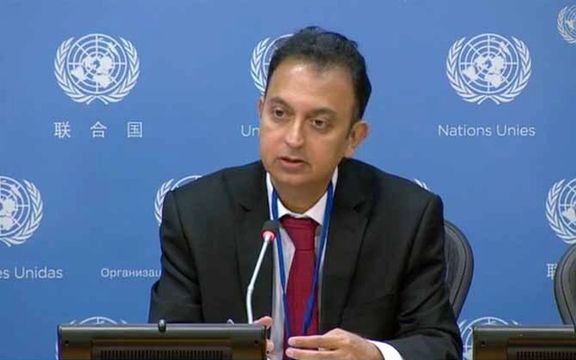
The UN Special Rapporteur on Iran says the levels of killings, torture, and brutality against the Baluch minority in Iran are “shocking”.
Speaking at an event in London on Saturday, Javaid Rehman revealed that more than half the total number of people that were killed since the start of the “Woman, Life, Freedom” protests were from the Baluchis and Kurdish-populated provinces.
“Children from Iran's Baluch and Kurdish provinces constituted at least 63% of the recorded victims of the protest,” the official said.
In Iran's eastern Sistan-Baluchistan province, there are many ethnic Baluch who are mostly Sunnis. The Baluch community has been one of the most persecuted in Iran during the past 44 years, with the highest execution rate.
The event called “Baluchistan: Dignity, Freedom and Justice for All” coincided with the 75th anniversary of the Universal Declaration of Human Rights and was organized by the Association des Chercheurs Iraniens (ACI).
Javaid Rehman said in his last report to the United Nations he pointed out that the Baluchis are disproportionately targeted and executed within the Iranian criminal justice system.
The Baluch community represents only two to six percent of the Iranian population, yet they account for around thirty percent of all executions. Security forces also target them extrajudicially.
“In the first nine months of 2023 at least 90 people have been murdered extrajudicially by the Iranian security forces including at least 22 fuel carriers,” Rehman added.
According to Amnesty International Iran executes more people annually than any other nation except China.
The UN Special Rapporteur said Baluchis are “undermined systematically because they are left in poverty, rendered vulnerable to man-made or environmental calamities and politically, economically and socially they are so disempowered that they do not have a voice.”
He called the oppression, persecution, and discrimination against Baluchis a “systematic state policy”.
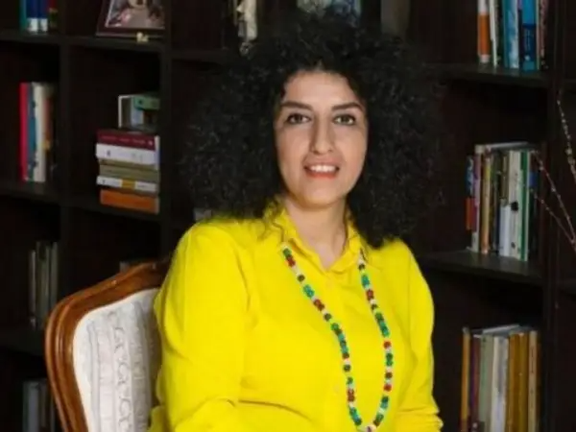
As Iranian Nobel Peace Prize laureate Nargess Mohammadi remains imprisoned, her children express apprehension about the possibility of reuniting with their mother.
In a press conference held in Oslo, Mohammadi's children expressed immense pride in her unwavering advocacy for women's rights as they prepared to accept the prestigious award on her behalf.
The 17-year-old twins, residing in Paris, are scheduled to receive the honor at Oslo's City Hall and deliver the Nobel Peace Prize lecture om their mother's behalf. In a letter sent from prison, Mohammadi reaffirmed her commitment to the cause of human rights, even in the face of potential death, expressing that she missed her children the most.
Kiana Rahmani, who last saw her mother eight years ago, expressed a pessimistic outlook on the prospect of a reunion, stating, "Maybe I'll see her in 30 or 40 years, but I think I won't see her again." She emphasized that despite this, her mother's legacy would endure in her heart and within their family.
Mohammadi, 51, earned the Nobel Peace Prize on October 6, a symbolic rebuke to Tehran's theocratic leadership, which subsequently condemned the award.
In her message from prison, Mohammadi acknowledged imprisoned journalists and emphasized, "In the darkness cast over information and the people of Iran, despite the shutdown of media outlets, our activism persists."
Speaking about the detention of over 100 journalists during the Women, Life, Freedom movement, she highlighted that in the past 20 years, at least 200 newspapers have been shut down, and 800 journalists have been detained.
Mohammadi addressed journalists, stating, "Independent media are our best allies in the fight against the destructive policies of the Islamic Republic."
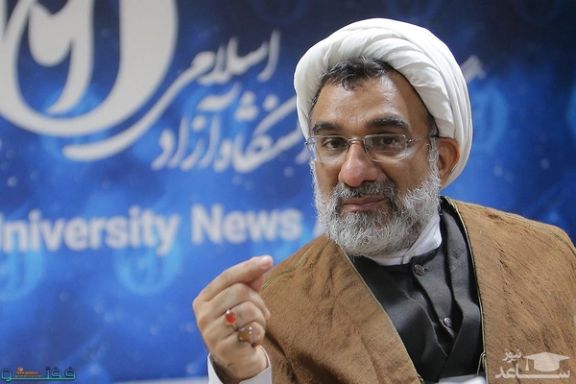
An Iranian cleric in charge of ideological enforcement claims that 94% of Hollywood actresses in the United States have experienced sexual assault and rape.
In a Saturday ceremony in Tehran, Abdolhossein Khosropanah, the secretary of the Supreme Council of the Cultural Revolution, made the startling claim saying the statistic is the highest rate of violence against women in the US.
However, notable for his assertion was the absence of any source or evidence to support the claims. Khosropanah went on to state, "Human rights have been restricted to propaganda games," dismissing criticism of Iran's own violations.
His comments come in the wake of a recent UN General Assembly committee resolution that criticized Iran for various human rights violations, including discrimination against and harassment of women and girls. The resolution, initially introduced by Canada, condemned the Iranian regime's misogynistic policies and practices, urging Tehran to cease its discrimination against women.
Despite international criticism, the Iranian regime has continued to tighten legislation, particularly targeting hijab and 'chastity' laws. The crackdown coincides with a growing number of women in Iran rejecting the mandatory headscarf and restrictions on their public appearance. Surveillance has intensified, and recent tragic incidents, such as the death of 16-year-old Armita Geravand, echo the concerns raised by the Women, Life, Freedom movement, sparked by the death of Mahsa Amini last year while in morality police custody.
Iran's MeToo movement has been active in shedding light on systemic sexual abuse within the country's legal system, with women facing constant threats of sexual violence both on the streets and in prison.